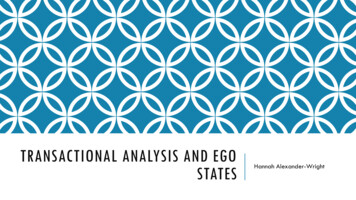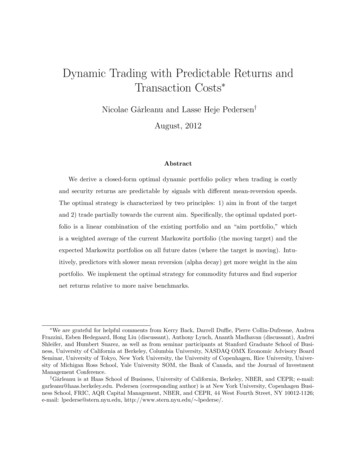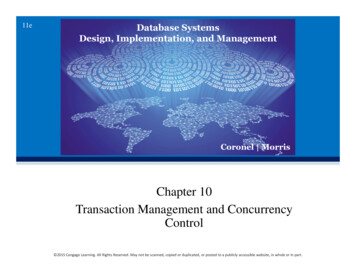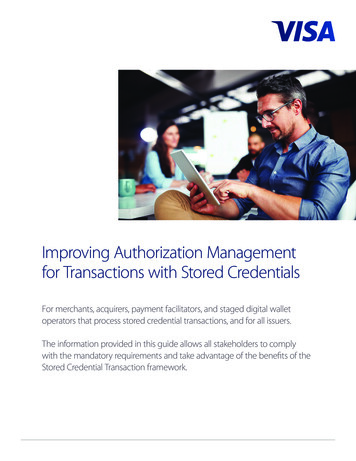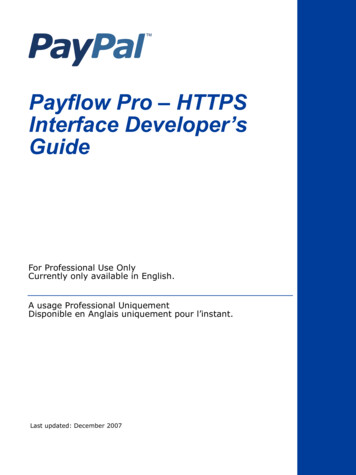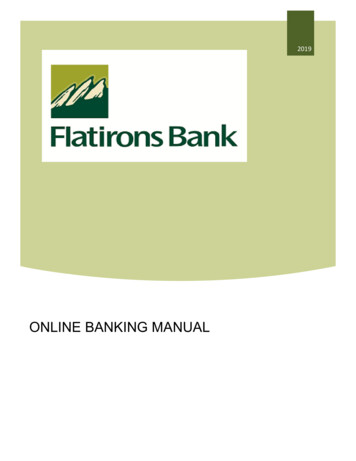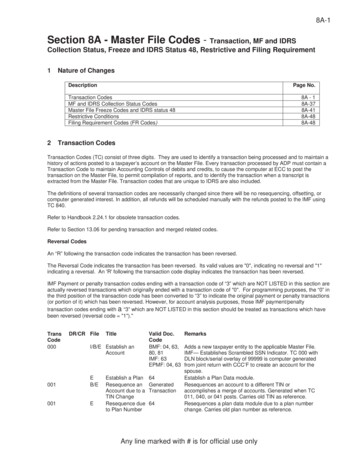
Transcription
Transaction Analysis - the three statesThe theory of transactional analysis was developed by Eric Berne in the 1950’s. Hesuggested that when we communicate with others we do so in one of three states.We communicate as a parent would communicate, as a child would communicate, oras an adult communicates.The state that we fall into will be based on our past experiences.When we are in the parent state, we can adopt one of two approaches. We can be: Nurturing Parent – In this state we are very caring and maternal. Controlling Parent – In this state we can be controlling and judgemental.In the child state we can also do one of two things. We can be: Free Child – In this state we are carefree, playful, uninhibited (and undisciplined)and creative. Adapted Child – In this state we can be obedient or, on the other hand, resentfulor manipulative.In the adult state we behave much more logically, basing what we say and do onfacts and an objective analysis of the situation.All of us have access to all three states, and we all use different ones at differenttimes. They all have their uses, have their strengths and weaknesses and areappropriate in different circumstances. For example free child state is particularlyuseful if we want to generate lots of new ideas in a brainstorm session.We are however, likely to have preferred states or a tendency to adopt some morethan others, and it is the balance between the three which are said to make up ourpersonality.To understand how we can achieve smoother more effective communication withpeople we need to understand how we are communicating.The Parent StateThe parent state has two sides:Controlling, disciplining, restricting parent, using words like: Right/wrong. Good/bad. Never/always.Nurturing, helpful, caring, loving parent, using words like: What a shame. Take care. Remember to
I’ll help you It won’t take me long to This state comes from our experiences of life with our parents and teachers,particularly in early life: “Sit up straight at the table” (controlling) “Use your knife and fork properly” (controlling) “Bring it here and Mummy will help you” (nurturing)When we feel, think, talk and behave in the way we remember our parents doingthen we are adopting a parent state: “In our line of business ” (controlling) “Leave it to me ” (nurturing)Often it is the attitude rather than the actual words that reveal themselves in later life.The Adult StateAll facts, logic and common sense contribute to the adult state. It is the mature anddeliberating part of personality. When we are in this state our actions and words aresensible and well considered - as opposed to the almost automatic reactions of theparent or child states. In the adult state we collect information, evaluate it, work outpossibilities and resolve problems in a logical, calm way. We concentrate on facts not feelings and prejudices.The Child StateThe child state represents the child we once were. It comes from all our emotionsand early experiences as well as our initial view of ourselves and others. It has twofacets: The natural or free child – impulsive, instinctive, creative, undisciplined anddemanding. The adapted child – carrying the influences of our upbringing, “doing as we aretold” giving rise to guilt, rebellion, obedience and compromise.In the child state we’ll use words like: I won’t. I must. I like. You always try to Help me If only It’s not fair.
Dominant statesIt is important to determine which is your dominant state and decide for yourselfwhen this is an advantage and when a disadvantage.If you have a dominant “controlling parent” state then you almost certainly have astrong personality and probably find it relatively easy to get people to do what youwant of them. Take care of making enemies or giving people the impression that youdo not respect them. Watch too that you don’t put a block on others developing ideasor skills.A dominant “caring parent” state can create a strong positive impression. You can beseen as good and helpful. However, an exaggerated concern for others can inhibitthem and take away their influence. It can also result in you taking on too muchyourself in a desire to help.A dominant “adult” state has advantages in many circumstances. In difficult, stressfulor quarrelsome situations the best you can do is to relax and stick to the facts. If youare respected as a person who keeps a cool head then people will turn to you foradvice. If your adult state is too dominant there is a risk that you won’t spend enoughtime having fun.A dominant “child” state contains great powers such as intuition, spontaneity andinspiration. It is very useful when you want to think creatively and generate ideas. Inthe child state you can spread happiness, warmth and a love of life. You can inspireand motivate people and get them to accept your proposals for emotional reasons.However, the child state also contains primitive aggression, resentment, and evenselfish responses.Parallel and crossed transactionsWhen two people get together, a transaction occurs that can be observed andanalysed. These can be parallel transactions, which proceed smoothly because eachparty is using the expected state. However, we get crossed transactions when oneparty adopts a state that was not expected. This is when we can get into conflict anddifficulties.ParallelTransactionsA transaction is a communication between ego states. There aretwo sorts of transactions - parallel and crossed. Let us look atsome examples.
CHAIRMANParent to ParentPM.D.PChairman: "I'm sick and tired of thesejunior employees with their long hair."M.D.: "I agree. On Monday we'll reallycrack down and stamp it out."ACACHere two people are talking to one another criticising a third party. They are agreeingwith each other. There is no conflict so the lines of communication are parallel.M.D.Adult to AdultPACSALESDIRECTORPM.D.: "There seems to be someunhappiness in the Sales Department."ASales Director: "Well, let’s get togetherwith them and see if we can find outthe problem."CAgain, the two people are communicating well. Many business communications areon this level.
Child to ChildDISSATISFIEDCOLLEAGUE TOANOTHERDISSATISFIED CLERKPACPACDISSATISFIED COLLEAGUE: "I'malways given the boring work. Myboss never gives me anyresponsibility."ANOTHER DISSATISFIEDCOLLEAGUE: "I'm like a nurse maid. Ihave to run errands for my boss all thetime."These two are having a good old gripe session and are really getting on well!JOHNCrossedTransactionsPACJAMESPJOHN: "Why do you always ask methe time? Go out and buy a watch foryourself. Do you understand?"AJAMES: "I don't need you to tell mewhat to do. Why don't you learn somemanners?"CHere both people are criticising each other, they are both in the parent ego state, butlines of communication here are crossed and these is conflict.MANAGERPACTEAMLEADERPMANAGER: "When will you organiseyour staff to come in on time? They'realways late"ATEAM LEADER: "Can you tell me whowas late and I'll follow it up?"CThe manager here is in his parent ego state, but despite being talked down to as ifhe was a child, the team leader responds adult to adult.
PAMANAGERPPPERSONAL ASSISTANT: "When doyou need the report?"AACMANAGER: "Don't you ever listen! Isaid by today."CThe personal assistant her talks to the manager in a non-provocative, reasonableway but he snaps back at her in his parent ego state. Again because of the crossedtransaction, there is conflict.Which conflict situation is closest to being resolved? The manager/team leadersituation is closest to being resolved because of team leader adult response.What can we learn from this? When we get crossed lines on transactions then communication is broken if we can avoid crossed lines we can avoid conflict situations if we can recognise which ego state the other person is in by the way he istreating us, then we can solve conflict. In business we usually aim for an Adult Adult transaction.Let us look at some examples:Say a customer addresses you as parent to child.CustomerPACYouPCustomer: "Why can't yourstupid company get mypackage to me on time?"ACYou have a few options as to how you could reply .
You could snap right back at him.CustomerPACYouPYou: "Who are you callingstupid?"ACFar better to stay calm, adult and rational.CustomerPACYouPYou: "If you could just giveme the details, I will get onto sorting out yourproblems right away".ACThis gives a chance to get the customer back on to the adult - adult level when herealises that you are concerned and want to help him with his problems.CustomerPACYouPACCustomer: "Well I'mrelieved that somebodyis going to do somethingabout this."
Depending on the circumstances an apology might be due. This involves beingtemporarily dominated:CustomerYouPPAACCCustomer: "Why can'tyour stupid company getmy package to me ontime?"You: I'm sorry, we didmess things up this timefor you. We had aproblem at our deliverydepot and didn't checkthe date.I'm really sorry to causeyou a problem."But this brief 'eating of humble pie' is worth it if it acts as a stepping stone toestablish an adult -to-adult interaction.CustomerYouPPCustomer: "Well, Isuppose these sort ofthings do happen".AAYou: "Let's see what wecan do to get thingssorted out quickly."CC
Transaction Analysis - the three states The theory of transactional analysis was developed by Eric Berne in the 1950's. He suggested that when we communicate with others we do so in one of three states. We communicate as a parent would communicate, as a child would communicate, or as an adult communicates.




